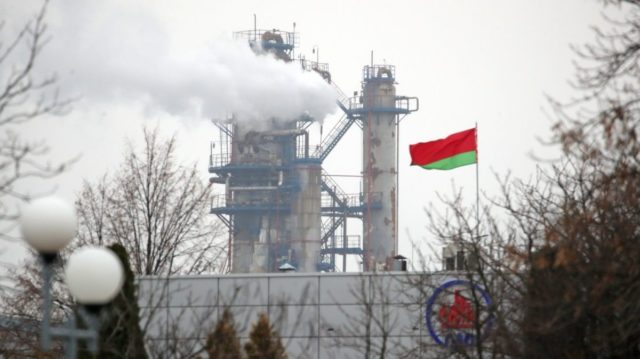
Belarus continues to scramble for alternative sources of oil, two months after traditional Russian suppliers stopped deliveries through the Druzhba pipeline (see EDM, January 22 and February 13). The five suppliers that for years supplied 90 percent of Belarus' oil stopped exports on January 1. Since then, Belarus' state oil company Belneftokhim has signed purchase agreements with Azerbaijani and Norwegian companies, as well as non-traditional Russian suppliers, to try to make up for the loss of 18 million tons of crude oil per year.
Azerbaijan's state oil company SOCAR has already agreed to supply Belarus with 160,000 tons of crude oil, and Belarusian Prime Minister Sergei Rumas met with SOCAR officials on March 2 to discuss additional purchases (Belta.by, March 3). Belarus will import SOCAR's crude oil through a pipeline stretching from Ukraine's main Black Sea port of Odessa to Brody in northwestern Ukraine. The oil will then be sent north to Belarus' Mozir refinery, a joint venture between Russian oil giants Rosneft and Gazprom Neft.
Belarus and Russia have repeatedly tried to resolve the dispute, ostensibly over a price dispute but in reality due to Minsk's reluctance to join the Russian federation.de facto or Legal) rules out Belarusian independence. The talks also included several one-on-one meetings between President Alexander Lukashenko and President Vladimir Putin.
Belarus is asking its traditional oil suppliers, including Rosneft, Gazpromneft, Surgutneftegaz and Tatneft, to remove the $10 per barrel premium they impose on the price of oil. The four countries are demanding the premium because Russia exempted Belarus from paying export taxes on Russian oil. At one time, Russian exporters had to pay the export tax themselves, resulting in a loss of $10 per barrel. However, Russia has since shifted the tax from exporters to producers, leading Belarus to claim that the premium it has been paying is no longer necessary.
Belarus has been receiving Russian oil at a price far below what Moscow charges all other customers around the world. But prices have risen and Belarus says the discount is only 17%, meaning Minsk is arguing that Russia should remove the premium. Putin apparently offered a $2 a barrel discount in a phone call with Lukashenko on February 21 (Spglobal.com, February 21), but the price standoff continues due to differing interpretations of his proposal (Naviny.by, February 21).
Belarus and Russia have been in conflict multiple times in recent years over oil and gas prices, but the latest disruption to Druzhba supplies is the longest since 2004. But curiously, the Kremlin has allowed Belarus to make up some of its lost supplies with non-traditional Russian suppliers.
The first to step in were sister companies owned by oil tycoon Mikhail Gucheriev. His companies Sakhmar and Neftis agreed on January 2 to send 750,000 tons of oil to Belneftim, partly via the Druzhba pipeline and partly by rail (Sputnik.by, February 5). Since then, Russia RIA Novosti News agencies reported that UDS NEFT, Yankpur and Tatneft also want to supply Belarus with up to 1 million barrels of crude oil per day (Interfax, February 21).
Meanwhile, US Secretary of State Michael Pompeo told Lukashenko during a meeting in Minsk on February 1 that the US would supply all the oil and natural gas Belarus needs to maintain its independence from Moscow. In response, Lukashenko said he hoped the US would arrange low-interest financing for an oil pipeline from the Baltic Sea through the Baltic states to Belarus (1prime.ru, March 3).
Belarus is also working with Ukraine to restart the Odessa-Brody pipeline, which has been idled since 2011 because the crude oil it transports is much more expensive than the crude oil pumped through Druzhba. In a sign of how serious Belarus is about restarting the Odessa-Brody route, Minsk has drawn up a tariff for the construction of a 40-kilometer pipeline from Brody to the Mozyr refinery (Neftegaz.ru, February 27).
Since the January 1 cutoff of Russian oil supplies, Belarus has been able to find limited alternative sources of crude oil for its refineries. Exports of finished petroleum products from refineries are the lifeblood of the Belarusian economy. However, the price of crude oil from these new sources is in each case much higher than the price of crude oil from Belarus’ traditional Russian sources. Moreover, the volumes procured from these alternative sources are not high enough to keep Belarus’ Mozil and Naftan refineries operating at full capacity. In January and February, both refineries processed 1.8 million tons of crude oil, half of what they did in the same period in 2019 (Belta.by, March 3). Due to the price conflict with Moscow, Belarus is also losing revenue from the 6 million tons of Russian crude oil it normally re-exports per day. Finally, all contracts with alternative sources have so far been short-term, a sign that Belarus does not intend to permanently replace its Russian supplies. As long as this situation continues, Moscow will be able to maintain a strong position in price negotiations, knowing that it has no leverage over Minsk.

